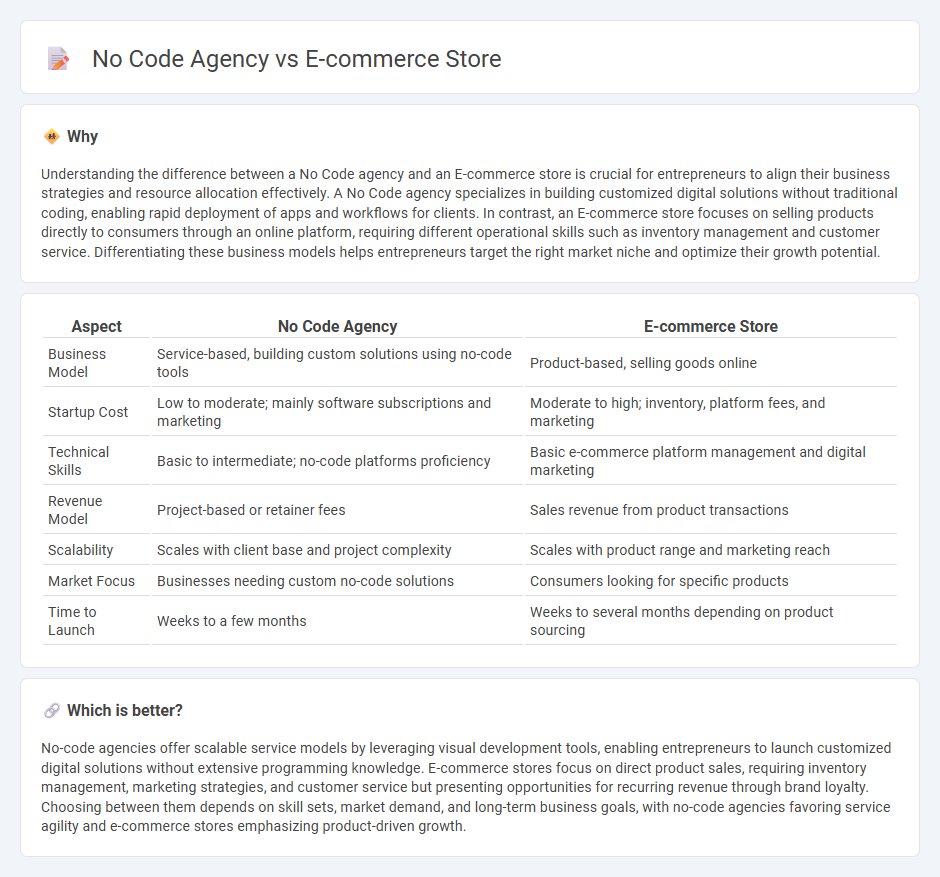
No code agencies specialize in building digital solutions quickly without traditional coding, enabling entrepreneurs to launch apps and websites efficiently. E-commerce stores focus on selling products online, leveraging platforms like Shopify or WooCommerce for streamlined shopping experiences. Explore the advantages and use cases of each model to determine the best fit for your entrepreneurial goals.
Why it is important
Understanding the difference between a No Code agency and an E-commerce store is crucial for entrepreneurs to align their business strategies and resource allocation effectively. A No Code agency specializes in building customized digital solutions without traditional coding, enabling rapid deployment of apps and workflows for clients. In contrast, an E-commerce store focuses on selling products directly to consumers through an online platform, requiring different operational skills such as inventory management and customer service. Differentiating these business models helps entrepreneurs target the right market niche and optimize their growth potential.
Comparison Table
| Aspect | No Code Agency | E-commerce Store |
|---|---|---|
| Business Model | Service-based, building custom solutions using no-code tools | Product-based, selling goods online |
| Startup Cost | Low to moderate; mainly software subscriptions and marketing | Moderate to high; inventory, platform fees, and marketing |
| Technical Skills | Basic to intermediate; no-code platforms proficiency | Basic e-commerce platform management and digital marketing |
| Revenue Model | Project-based or retainer fees | Sales revenue from product transactions |
| Scalability | Scales with client base and project complexity | Scales with product range and marketing reach |
| Market Focus | Businesses needing custom no-code solutions | Consumers looking for specific products |
| Time to Launch | Weeks to a few months | Weeks to several months depending on product sourcing |
Which is better?
No-code agencies offer scalable service models by leveraging visual development tools, enabling entrepreneurs to launch customized digital solutions without extensive programming knowledge. E-commerce stores focus on direct product sales, requiring inventory management, marketing strategies, and customer service but presenting opportunities for recurring revenue through brand loyalty. Choosing between them depends on skill sets, market demand, and long-term business goals, with no-code agencies favoring service agility and e-commerce stores emphasizing product-driven growth.
Connection
No code agencies enable entrepreneurs to rapidly develop and launch e-commerce stores without requiring advanced programming skills, significantly reducing time and cost. These agencies utilize no code platforms like Shopify, Webflow, or Bubble to create scalable, customizable online storefronts tailored to specific business needs. By bridging technical gaps, no code agencies empower e-commerce entrepreneurs to focus on marketing, product development, and customer engagement.
Key Terms
**E-commerce store:**
E-commerce stores leverage digital platforms to sell products directly to consumers, optimizing inventory management, payment processing, and customer experience through integrated software solutions. Advanced tools like Shopify, WooCommerce, and BigCommerce offer scalable solutions tailored for diverse business needs, enhancing conversion rates and user engagement. Explore how e-commerce stores can transform your retail strategy and drive online growth.
Product Listing
E-commerce stores excel in creating extensive product listings optimized for search engines, utilizing detailed descriptions, high-quality images, and structured data to improve visibility and conversion rates. No code agencies specialize in custom product listing solutions that integrate seamlessly with other tools and platforms, enabling tailored user experiences and efficient inventory management. Discover how combining these approaches can maximize your online sales potential.
Shopping Cart
An e-commerce store's shopping cart is designed to streamline product selection, secure payment processing, and order management, optimizing the user journey for higher conversion rates. No code agencies develop customizable shopping cart solutions using platforms like Shopify, WooCommerce, or Bubble, enabling businesses to implement tailored features without extensive coding. Explore how specialized shopping cart functionality can elevate your online sales and customer experience.
Source and External Links
eCommerce Website Builder: Build An eCommerce Site - An eCommerce website allows you to buy or sell physical or digital products online and includes features like product galleries, shopping carts, online checkout, and tools to manage payments, shipping, and marketing; building one requires a domain, hosting, products, payment provider, and design templates, which Wix provides in an all-in-one platform.
Build a Free Online Store or eCommerce Website - Square Online offers a free plan to create and customize a professional eCommerce site with features like unlimited product listings, shipping tools, and integration with Square POS to synchronize online and offline sales.
Shopify: The All-in-One Commerce Platform for Businesses - Shopify is a comprehensive platform to launch and grow eCommerce businesses with tools for online and in-person sales, multichannel publishing, customizable checkout, and global reach, serving merchants of all sizes from startups to enterprises.
 dowidth.com
dowidth.com